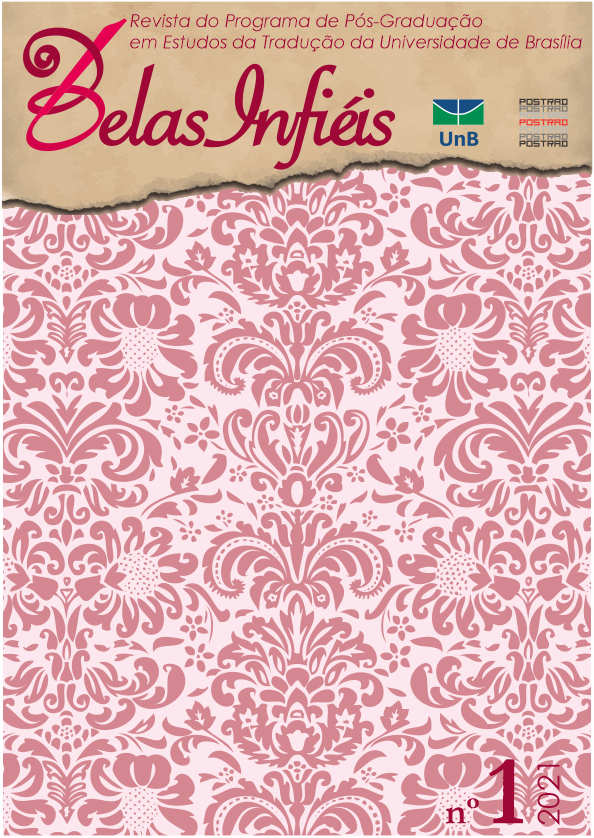Traduzindo fora do eixo: entrevista com Luciano Dutra
DOI :
https://doi.org/10.26512/belasinfieis.v10.n1.2021.32940Mots-clés :
Entrevista. Luciano Dutra. Literatura Nórdica.Résumé
A história do mundo está escrita em línguas imperiais como português, espanhol, inglês e francês. Estes idiomas de prestígio internacional são também línguas colonizadoras, e nisso se implica uma forte relação com difusão, produção, tradução e poder, a isso chamamos de geopolítica da linguagem. A área da tradução, tanto quanto os estudos da linguagem, é um importante campo de pesquisa e produção dentro da diegese internacionalista que decorre da república internacional das letras. O empenho tradutório está, na verdade, circunscrito tanto na ampliação de um mundo anglófono quanto no âmbito resistente que propõe a constante aproximação de línguas menos hegemônicas. Esta segunda situação é certamente o caso de Luciano Dutra, que se mudou para Islândia inspirado pelas referências nórdicas de suas leituras de Borges. Nas terras gélidas onde se originaram as sagas islandesas, Luciano Dutra se tornou fluente no islandês, idioma pouco frequente em cursos de língua ou livrarias, e, mais que isso, se tornou tradutor de islandês-português. Nesta entrevista, Luciano Dutra compartilha um pouco desta vivência nórdica e de sua experiência como um tradutor fora do eixo.
Téléchargements
Références
Másson, Sigursteinn (Diretor). (2013). Ao sul eles foram [Filme]. Veritas.
Borges, J. L. (1978). Literaturas germánicas medievales. Alianza Editorial, 1978.
Guðmundsson, E. M. (2013). Anjos do universo [L. Dutra, Trad.]. Hedra. [Tradução de: Englar alheumsins]
Gunnarson, G. (2018). Aðventa. Forlagið Bókábúð. (Publicado originalmente em 1937)
Jensen, C. J. (2017). Nona Manhã/Níggindi morgun [L. Dutra, Trad.]. Moinhos/Sagarana Forlag.
Klougart, J. (2019). Ascensão e queda [L. Dutra, Trad.]. Moinhos/Sagarana Forlag. [Tradução de: Stigninger og fald]
Knausgård, K. O. (2013). Minha Luta [L. P. Silva, Trad.]. Companhia das Letras. [Tradução de: Min Kamp]
Mãe, V. H. (2014). A desumanização. Cosac Naify.
Moreira Salles, J. (2009, janeiro). A grande ilusão. Revista Piauí, (28). Acesso em 20 de julho de 2020. https://piaui.folha.uol.com.br/materia/a-grande-ilusao/
Ortega y Gasset, J. (1937). Miseria y esplendor de la traducción. La Nation.
Ramil, V. (2004). A Estética do Frio ”“ conferência de Genebra. Satolep.
Sjón. (2017). Pela Boca da Baleia [L. Dutra, Trad.]. Planeta do Brasil. [Tradução de: Rökkurbýsnir]
Sjón. (2014). Raposa sombria [L. Dutra, Trad.]. Hedra. [Tradução de: Skugga-Baldur]
Téléchargements
Publié-e
Comment citer
Numéro
Rubrique
Licence
(c) Tous droits réservés CC BY 2021

Cette œuvre est sous licence Creative Commons Attribution 4.0 International.
Copyright Statement
Given the public access to this journal, the texts are free to use but requires the recognition of the original authorship and initial publication in this journal to be properly stated.
The journal allows the use of works published for non-commercial purposes, including the right to submit the work to publicly accessible databases. Published contributions are the sole and exclusive responsibility of the author(s).
- When submitting papers to be evaluated by the Belas Infiéis journal, the author(s):
- Declare that the contents of the contributions are original and of their original creation, being entirely responsible for their content if there is an objection by third parties.
- Claim to be aware that they should not commit academic plagiarism.
- Declare that the manuscript has not been published, completely or partially, in Portuguese or another language. If it is a translation it should be submitted to the Translated Articles section.
- Declare that the manuscript is not being evaluated by other journals.
- Declare that the manuscript was not submitted to another journal simultaneously.
- Commit(s) to inform the journal of any kind of error or inaccuracy in their contribution (published, in evaluation or in editing) and to collaborate with the editors to make due corrections of the article (when in evaluation or editing) or erratum/retraction (after publication).
- Declare that there is no conflict of interest regarding the published work.
- Authorize its release if it is accepted for publication without any kind of monetary compensation.
- Agree to assign non-exclusive rights to publication to the magazine, remaining free to make their contribution available in other media as long as the publication of the first version in Belas Infiéis magazine is mentioned. They also authorize Belas Infiéis to assign their texts for reproduction in content indexers, virtual libraries and similar platforms.
- Maintain copyright and grant the journal the right of first publication, the work being licensed under theCreative Commons Attribution License.
- Is/Are allowed and encouraged to publish and distribute their work online after the editorial process, which may increase the impact and citation of the published work.
- Authorize the editorial team to make textual adjustments and to adapt the article to the publication rules, when necessary.



















